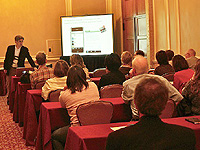- Categories:
BTW News Briefs
SCIBA Brings Fall Trade Show Season to an End
Last weekend, the Southern California Independent Booksellers Association brought the fall trade show season to an end at the Biltmore Hotel in downtown Los Angeles. And, despite the economy, SCIBA Executive Director Jennifer Bigelow reported that bookstore and bookseller attendance was up.
Among the shows many highlights were two firsts: the address by SCIBA's first keynote speaker, Elizabeth Kostova, author of The Historian and the forthcoming The Swan Thieves (both Little, Brown), and the presentation of the first Glenn Goldman Scholarships, in memory of the late owner of Book Soup, who passed away in January. The recipients were Judy Kruger of Once Upon a Time in Montrose and Catherine Linka of Flintridge Books & Coffee House in La Canada.
The digital revolution was on the minds of those booksellers who participated in ABA's "Going Digital: The Case for E-Books," presented by ABA COO Len Vlahos, and an afternoon seminar "Using Edelweiss Interactive Catalogs," presented by Above the Treeline.
SIBA Forgoes Dues for One Year
In a new policy just announced to its members this week, the Southern Independent Booksellers Alliance (SIBA) has offered to forgo collecting membership dues from its stores for the upcoming year if the stores will allow SIBA to place a single banner ad on their store websites. The ad, whose content will be sold by and controlled by the organization, will appear simultaneously on every participating SIBA store site for the duration it is booked.
"We are always looking for ways to show the impact and clout our stores have on the market," said SIBA Executive Director Wanda Jewell. "We're happy we've found a way to help, and can still give stores access to all the many benefits of being a member of SIBA."
Gift Cards Expected to Regain Popularity
Reuters reported that gift cards are expected to do well this season, after losing popularity with shoppers last year, as retailers and other card purveyors offer freebies and lower fees. Gift cards often bring additional revenue to retailers since consumers who use their cards often spend more than the value of the card, said Stacy Janiak, vice chairman and U.S. retail leader for Deloitte LLP.
Gift cards lost ground last year as consumers opted for buying at huge discounts on goods and had concerns that retailer bankruptcies would render cards bought at those stores worthless, reported Reuters. Shoppers spent approximately $24.9 billion on gift cards during the holidays in 2008 -- with an average of $40 on a card -- a fall from the $26.3 billion spent in 2007, according to the National Retail Federation (NRF). This year, however, retailers are expected to offer smaller discounts, and gift cards will reassume their consumer appeal.
Small Businesses May Face Significant Increase in Health Insurance Premiums
As Congress gets set to overhaul the health care system, the New York Times reported that many small businesses are about to face the sharpest increase in health insurance premiums in recent years. Insurance brokers and benefits consultants told the Times that their small business clients are watching their premiums go up by an average of about 15 percent for the coming year, which doubles last year's increases.
The reason for the drastic price hikes is due in part to increasing medical costs. However, the Times noted that some experts speculate that the insurance industry is under pressure from Wall Street to "get ahead of any legislative changes that might reduce their profits." Joshua Miley, a consultant with HighRoads, a company that analyzes benefit information for employers, told the Times. "The undercurrent of health reform is driving part of the renewal increases."
However, the Times did stress that negotiations over next year's premiums are still under way, so data on rate increases are mostly "anecdotal." Health benefits consultants who track the figures have not year completed any formal surveys.
Senators Reid and Baucus Look to Expand Carryback
Senate Majority Leader Harry Reid (D-NV) and Senate Finance Committee Chairman Max Baucus (D-MT) are planning to introduce an amendment to an unemployment insurance bill that would expand the "carryback" of net operating losses to help retailers suffering in the current recession, according to the National Retail Federation (NRF). The amendment would lengthen the period during which retailers and other businesses can "carry back" current losses suffered in the current recession in order to claim a refund from taxes paid in previous years when they made a profit. This week, NRF wrote Senate members urging them to support the amendment.
"For retailers struggling in the current recession, [net operating losses] carryback provides an important source of capital to finance ongoing operations and retain employees," NRF Senior Vice President for Government Relations Steve Pfister said in the letter. "Because retail sales have fallen so dramatically over the past year and access to capital has been so limited, retailers are experiencing severe challenges in finding the cash they need to operate their businesses as the economy moves toward recovery."
Carryback is normally limited to two years, but the economic stimulus legislation signed into law in February expanded the period to five years for companies with up to $15 billion in annual gross receipts. Larger businesses are still restricted to two years.
The Reid/Baucus amendment is expected to expand the five-year period to include all businesses that suffer a loss regardless of size, and to give companies the choice of using the carryback for losses from either 2008 or 2009, rather than just 2008 as provided in the stimulus bill. In the fifth year, the carryback would be limited to 50 percent of a company's taxable income for that year, but any loss not utilized could be "carried forward." Small companies that took a five-year carryback under the stimulus bill could carry back 2009 losses as well.


